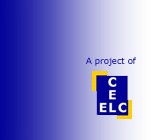| CONFERENCE | FOUR TASK GROUPS | RELAY POINTS |
|---|---|---|
|
The Closing Conference of the ENLU project was held in the presence of Commissioner Ján Figel' in Nancy on 7-8 April 2006. The principal outcome of ENLU will be the launch of a more permanent network – HELP: Higher Education Language Policy. The Closing Conference of the ENLU project, attended by some 200 representatives of the European higher education languages community and other stakeholders, was organised by the P ô le Universitaire Européen de Lorraine and held at the Franco-German Undergraduate Campus of Sciences Po in Nancy on 7-8 April 2006. The keynote speech was delivered by Mr Ján Figel', member of the European Commission responsible for Education, Training, Culture and Multilingualism. Also present were representatives of the Council of Europe, the European University Association (EUA), the National Unions of Students in Europe (ESIB), the Academic Cooperation Association (ACA), and CercleS. ENLU Co-ordinator Wolfgang Mackiewicz told participants that the Europe-wide consultation conducted earlier this year had revealed that there was an urgent need, and substantial support for the creation of a more permanent European network devoted to the development and implementation of languages-for-all-undergraduates policies. The principal outcomes of the Conference, and the aims and activities of the HELP initiative are set out in the Nancy Declaration, which will be shortly published at the ELC site.
|
At
the launch conference held in Brussels on 23-24 April 2004, four task
groups were convened to undertake desk research and conduct surveys
in four areas deemed to be particularly relevant to the overarching
objective of the project. |
ENLU is setting up
national and regional relay points – universities eager to promote
the aims of the project by disseminating information about the project
and by helping to gather relevant information. For the full list of
Realy Points, |
ENLU - Creating A New European Network
ENLU is one of seven projects selected in the frame of the European Commission’s Call for proposals EAC/45/03, issued in preparation of the Action Plan Promoting language learning and linguistic diversity.The main objective of the two-year project is to create a trans-European network of higher education institutions and other stakeholder organisations with a view to achieving a breakthrough in the area of “languages for all”. The project is carried out under the auspices of the Conseil Européen pour les Langues / European Language Council (CEL/ELC), which has been engaged in language policy development and in European projects since it was founded in 1997. The project represents a response to the linguistic and cultural challenges posed by thecreation of a European higher education area and a European research area and by the Lisbon Strategy.
ENLU is driven by the vision that all graduates in Europe should
- be able to communicate in at least two languages other than their mother tongue,
- know how to learn new languages effectively,
- have the confidence to learn a new language when the need or opportunity arises,
- have first-hand experience in working and learning in other countries and in collaborating with other countries, and
- be familiar with other cultures and intercultural skills.
In order to realise this vision, ENLU is going to develop policies, scenarios and strategies that lend themselves to implementation under various institutional conditions. In 2005, ENLU will conduct a Europe-wide consultation and organise a major European conference, at which the new network will be officially launched.








